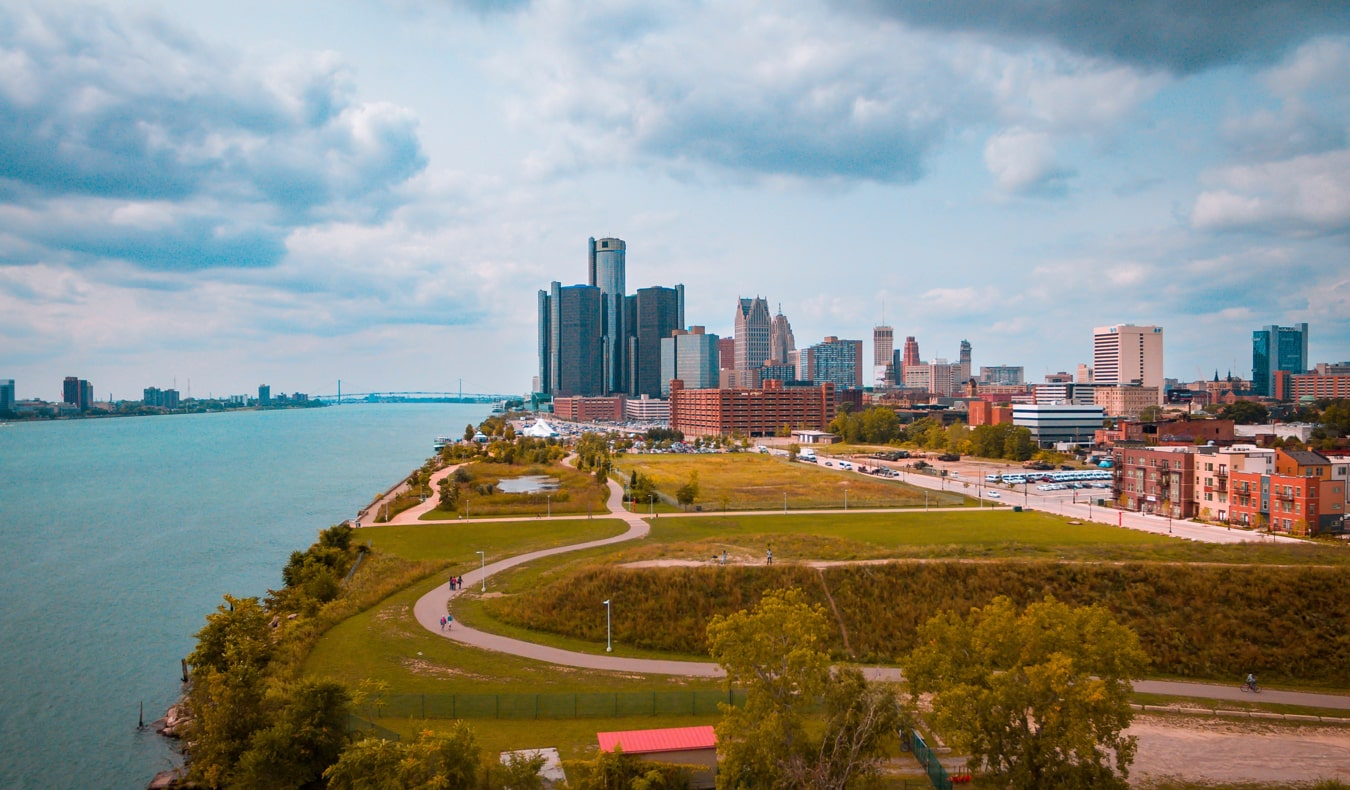Detroit, Michigan has transformed over the last decade from a struggling Rust Belt city to a thriving hub of culture, food, and entertainment. As the longtime home of the American auto industry and Motown music, Detroit has a rich history to explore. And new investments have revitalized downtown and surrounding neighborhoods with boutique hotels, innovative restaurants, and unique attractions.
| Attraction | Description |
|---|---|
| Belle Isle Park | A 982-acre island park featuring riverfront views, historical structures, and family attractions like an aquarium, conservatory, and more. |
| Eastern Market | A historic food hub operating since 1891, with vendors selling fresh produce, arts, and crafts. |
| Detroit Institute of Arts | An art museum with nearly 70,000 works spanning 6,000 years, offering tours and interactive programs. |
| Motown Museum | Celebrates the history of Motown music with tours of the original recording studio and exhibits. |
| The Henry Ford Museum | A history complex with exhibits on American innovation, including the Rosa Parks bus and Lincoln’s chair. |
| Comerica Park | Home of the Detroit Tigers, offering baseball games, carousel and Ferris wheel rides, and tours. |
| Riverwalk & Dequindre Cut | A series of trails and pedestrian bridges connecting parks, shops, and attractions along the Detroit Riverfront. |
| Campus Martius Park | A central downtown park hosting events and activities year-round, with an ice rink in winter and an urban beach in summer. |
| Architectural Tours | Guided tours exploring Detroit’s architectural history, including Art Deco towers and Victorian offices. |
| Pewabic Pottery | A ceramic studio offering tours, workshops, and a shop selling unique ceramic gifts. |
| Music and Performance Venues | Venues hosting a variety of live performances, including the Fox Theatre and Music Hall. |
| Corktown | A hip neighborhood with a vibrant dining scene, craft cocktails, chic shops, and trendy restaurants. |
Plan your Detroit getaway using this list of the top things to see and do in the Motor City. From world-class museums and theaters to historic neighborhoods and professional sports, Detroit offers visitors plenty of activities for a memorable vacation.
Belle Isle Park
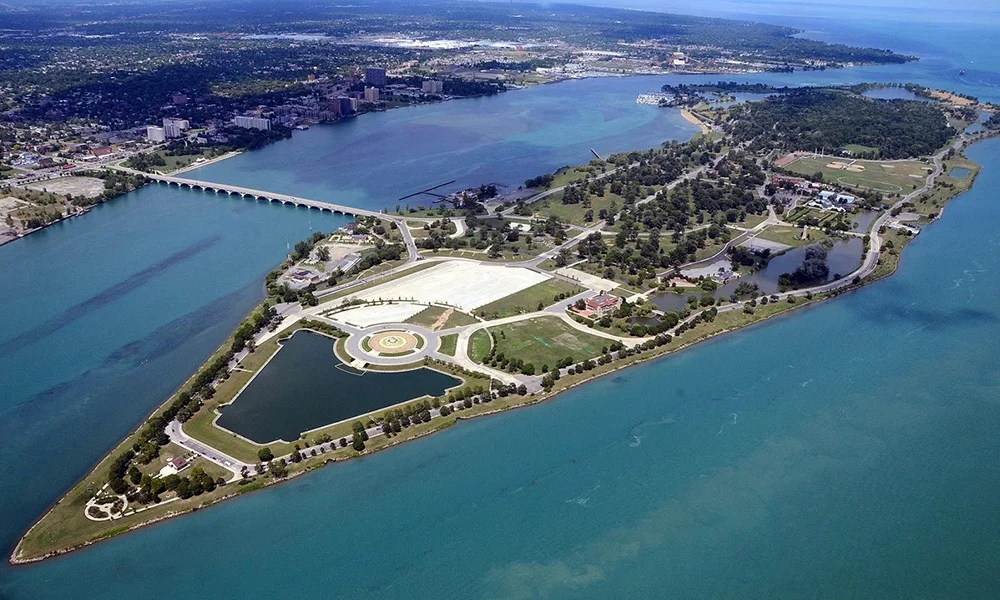
Name and Location: Belle Isle Park is a 982-acre island park located on the Detroit River about 3 miles east of downtown Detroit.
History and Significance: Belle Isle opened as a city park in the late 1800s after being purchased by the city of Detroit. It contains beautiful manicured gardens, historic structures, a conservatory, a beach, giant slide, trails, fields, and scenic river views.
What to Expect: Visitors come to Belle Isle for biking, hiking, walking, kayaking and relaxation surrounded by nature while still being in the city. Other attractions include the Anna Scripps Whitcomb Conservatory and the giant slide.
Visitor Information: Belle Isle is open daily 5am-10pm. There is a $12 annual fee for a recreation passport to drive onto the island, otherwise access is free.
Belle Isle perfectly encapsulates Detroit’s dual nature as both a gritty, working-class town and an oasis of natural beauty. The 982-acre island park features dramatic riverfront views, historic structures, and family attractions including an aquarium, conservatory, giant slide, nature zoo, giant slide, and beach. Rent a bike near the Scott Fountain to explore the island at your own pace. Or join locals on Saturdays when East Jefferson Avenue becomes a pedestrian-friendly promenade.
Eastern Market
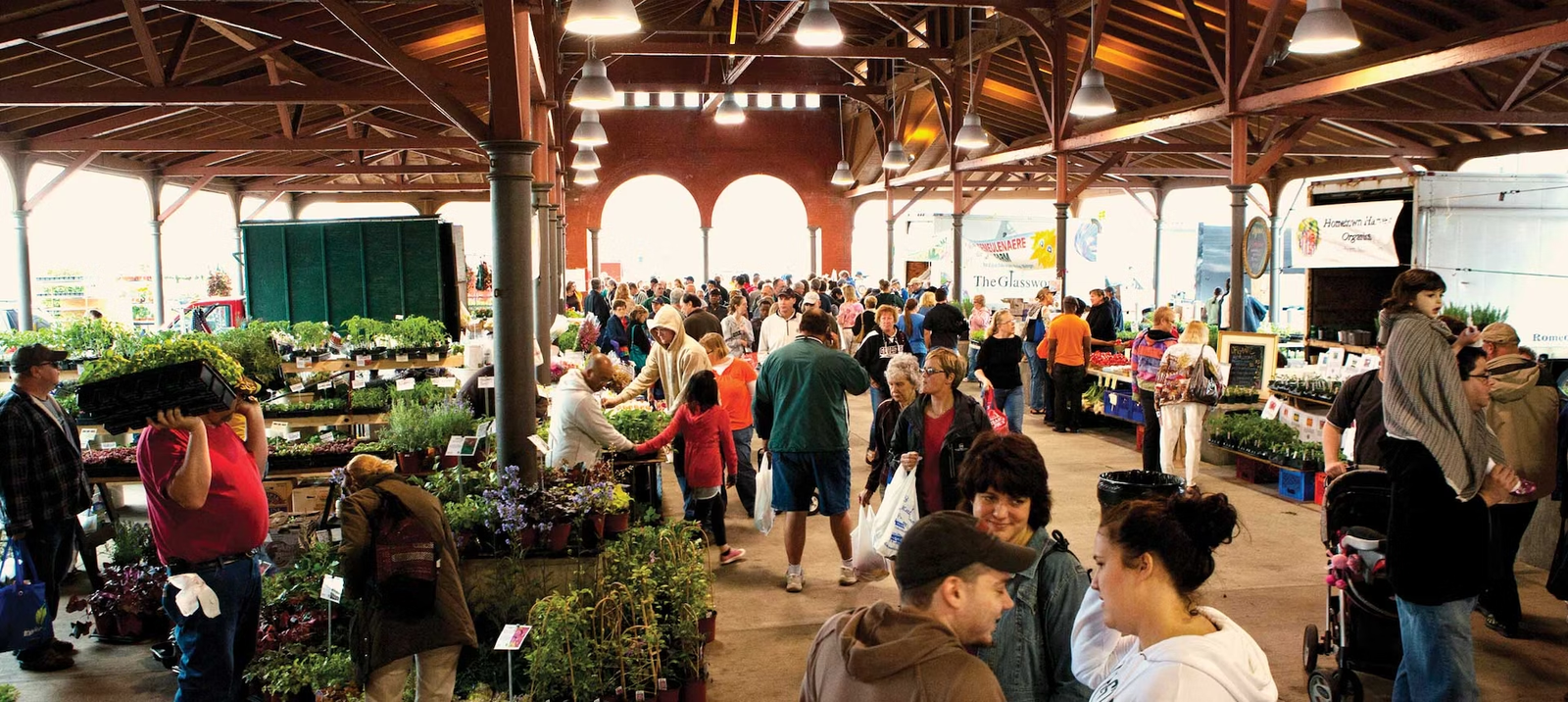
Name & Location: Eastern Market is a large historic farmers market district in central Detroit spanning six blocks.
History & Significance: Founded in 1891, it is one of the oldest and largest continuously operating farmers markets in the United States, supporting local food growers.
What to Expect: Every Saturday, Eastern Market hosts an energetic open-air farmers market selling produce, meat, cheese and flowers. Many wholesalers are also open Tuesday-Sunday.
Visitor Information: Eastern Market sits between Gratiot Ave, I-75, Adelaide & Wilkins St. The area is busiest on Saturday mornings but shops open all week.
Downtown’s historic Eastern Market has served as a food hub for the city since 1891. Marvel at towering murals painted on warehouses that now house spice merchants, butchers, and produce wholesalers supplying 300 independent vendors. Come on Tuesday when trucks arrive with fresh fruits and vegetables. Or visit on a Saturday morning when 250 open-air farmers and artisans sell a colourful bounty alongside ready-to-eat crepes, coffee, and craft cocktails. Don’t miss the chance for lunch at one of the city’s best restaurants nearby.
Detroit Institute of Arts

Name & Location: The Detroit Institute of Arts (DIA) is an art museum located on Woodward Ave in midtown Detroit.
History & Significance: Founded in 1885, the DIA has one of the largest and most significant art collections in the U.S. spanning over 3000 years of global creativity.
What to Expect: Visitors explore galleries featuring ancient, African, Asian, Native American, Islamic & European art, including the Detroit Industry murals by Diego Rivera.
Visitor Information: General admission is $14 for adults and $9 for youth. The DIA is open Wed-Sun with free entry on Wednesdays.
Discover why the sprawling Detroit Institute of Arts ranks among the most significant art museums in America. The encyclopedic collection here contains nearly 70,000 cultural treasures spanning the globe over the last 6,000 years. Wander Egyptian mummies, Medieval tapestries, Modernist masterpieces, Mesoamerican sculpture, and so much between. Daily tours and interactive programs make engaging with these world treasures even more rewarding. And best of all? General admission is free for Oakland, Macomb and Wayne county residents.
Motown Museum
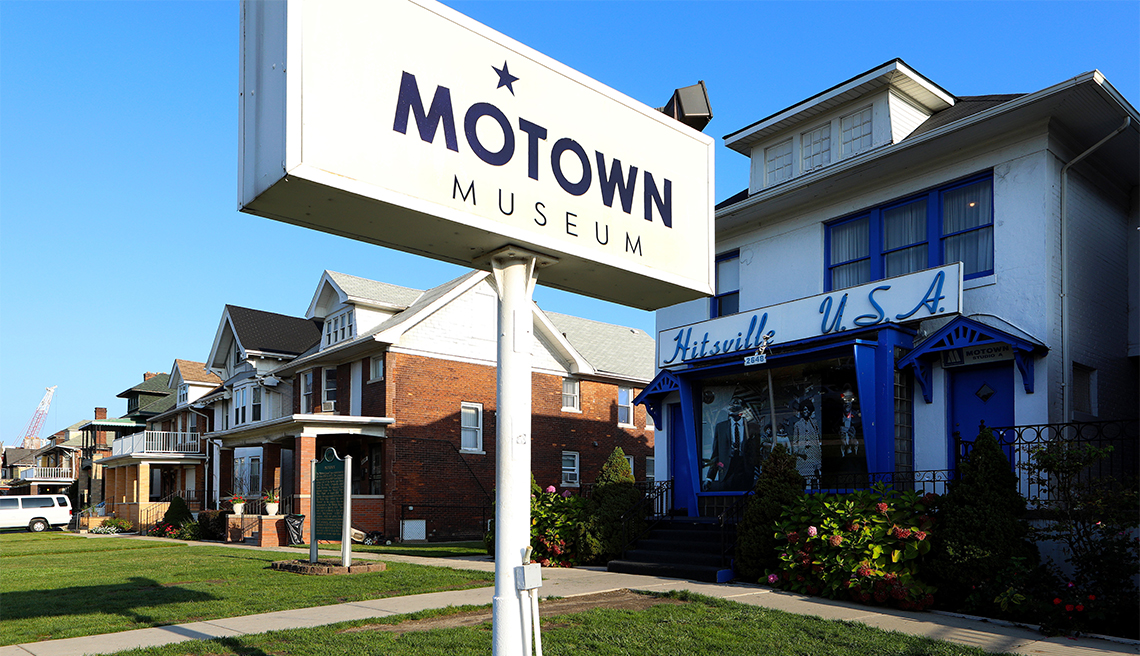
Name & Location: The Motown Museum is located at 2648 West Grand Boulevard in Detroit, in the original headquarters of Motown Record Corporation.
History & Significance: Founded in 1985, Motown Museum chronicles the story of Motown Records’ legacy through events and exhibits displayed in preserved recording studios where early hits were created.
What to Expect: Museum exhibits feature Motown history with photos, costumes, artifacts and more. Visitors can see the famed Studio A and other studios. Guided tours run frequently.
Visitor Information: The Museum is open Tues-Sun. Guided tour tickets are $20 and should be booked online in advance when available.
No trip to Detroit is complete without a pilgrimage to Hitsville U.S.A. This humble house turned out over 180 Top 40 hits from Motown stars like The Temptations, Stevie Wonder, The Supremes and Marvin Gaye from 1959 to 1972. Visitors can stand in Studio A to see where these future Hall of Famers recorded their first tracks. Then tour the lovingly preserved upper floors including the apartment where Berry Gordy launched his music revolution seven decades ago. A new plaza, interactive exhibits and facilities opening in 2023 will let guests fully immerse themselves in the Motown sound and story.
The Henry Ford Museum
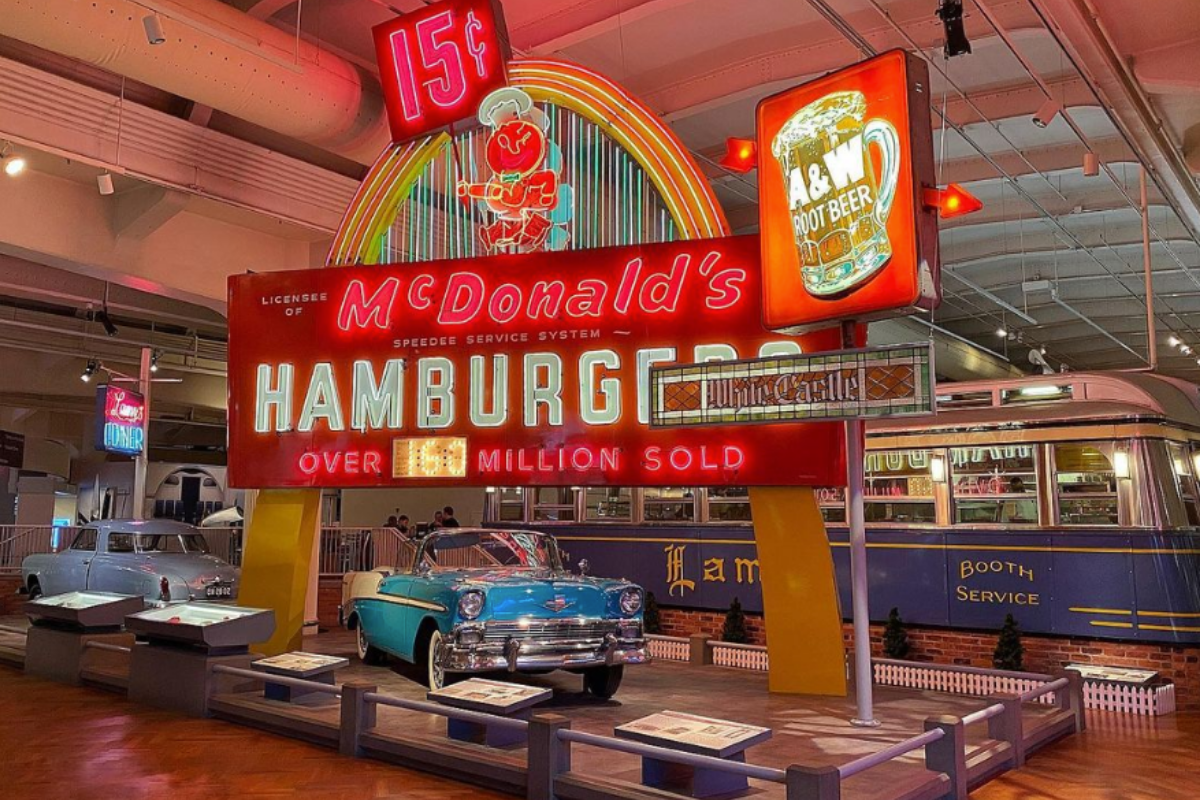
Name & Location: The Henry Ford Museum of American Innovation is located in the Detroit suburb of Dearborn, about 10 miles from downtown Detroit.
History & Significance: Opened in 1929, and named for founder Henry Ford, the museum contains historic exhibits exploring 300 years of American innovation and ingenuity in various industries.
What to Expect: Museum exhibits feature transportation innovations, presidential vehicles, furniture, clocks, engines, Thomas Edison’s lab, historic American homes, and more.
Visitor Information: The Henry Ford is open daily. General admission is $28 for adults, $24.75 for seniors 65+, $21 for kids 5-11 yrs. Free parking onsite.
Dearborn’s sprawling indoor and outdoor history complex provides enough educational entertainment across 300 acres to fill multiple days. Train enthusiasts flock to the landmark Henry Ford Museum to see locomotives and model railroads chugging past vintage Americana exhibits. Next door, explore the real Rosa Parks bus and Abraham Lincoln’s chair inside the museum. Then take the wheel of classic Model T’s that revolutionized manufacturing or enjoy a classic carousel spin. Buckle up for an IMAX movie too before touring four unique districts at Greenfield Village’s nearly 100 historic buildings.
Comerica Park

Name & Location: Comerica Park is the home ballpark for the Detroit Tigers located at 2100 Woodward Avenue, just north of downtown.
History & Significance: Comerica Park opened in 2000 to replace historic Tiger Stadium. The open-air stadium anchors Detroit’s sports and entertainment area, also hosting concerts and events.
What to Expect: Baseball fans flock to Comerica on game days from April to September. Tours allow visitors to explore areas like the dugout when games are not happening. Concerts also take place during summer months.
Visitor Information: Parking rates and availability vary per Tigers game or event. Public stadium tours run in the offseason and cost $10 per person.
Catch the excitement of America’s favorite pastime playing out across downtown’s vibrant Woodward Corridor. Baseball fans flock to Comerica Park from April through September to cheer on the Detroit Tigers. But visitors will also appreciate unique features like the vintage-style carousel and Ferris wheel rides. Guided tours let you explore the press boxes and luxury suites when games aren’t scheduled. And the ballpark district offers some of the city’s best dining and nightlife once the final pitch gets thrown.
Riverwalk & Dequindre Cut Greenway

Name & Location: The Detroit Riverwalk and Dequindre Cut Greenway are connected walking and biking paths located along the river and an old railroad line in central Detroit.
History & Significance: The Riverwalk connects Belle Isle to downtown while the Dequindre Cut spur heads north, linking Eastern Market to the riverfront. Both greenways enable recreation, exercise and transportation throughout the area.
What to Expect: Visitors can walk, jog, rollerblade or bike for miles along these paths while enjoying public art installations and city views, including a passage under/over a dozen streets and graffiti gallery.
Visitor Information: As urban trails, the Riverwalk & Dequindre Cut operate 24 hours for free public access all year.
Explore downtown and Eastern Market on foot (or bike or scooter) thanks to a series of trails and pedestrian bridges stitching the city together. The Riverwalk’s paved path along the Detroit Riverfront connects parks, shops, and attractions from the Ambassador Bridge to Belle Isle. Welcoming parks and public art line the 1.5 mile stretch. Heading north, the Dequindre Cut Greenway connects Eastern Market through a 2.0 mile below-grade rail-line-turned-wooded-path trailing street art murals to hip enclaves.
Campus Martius Park
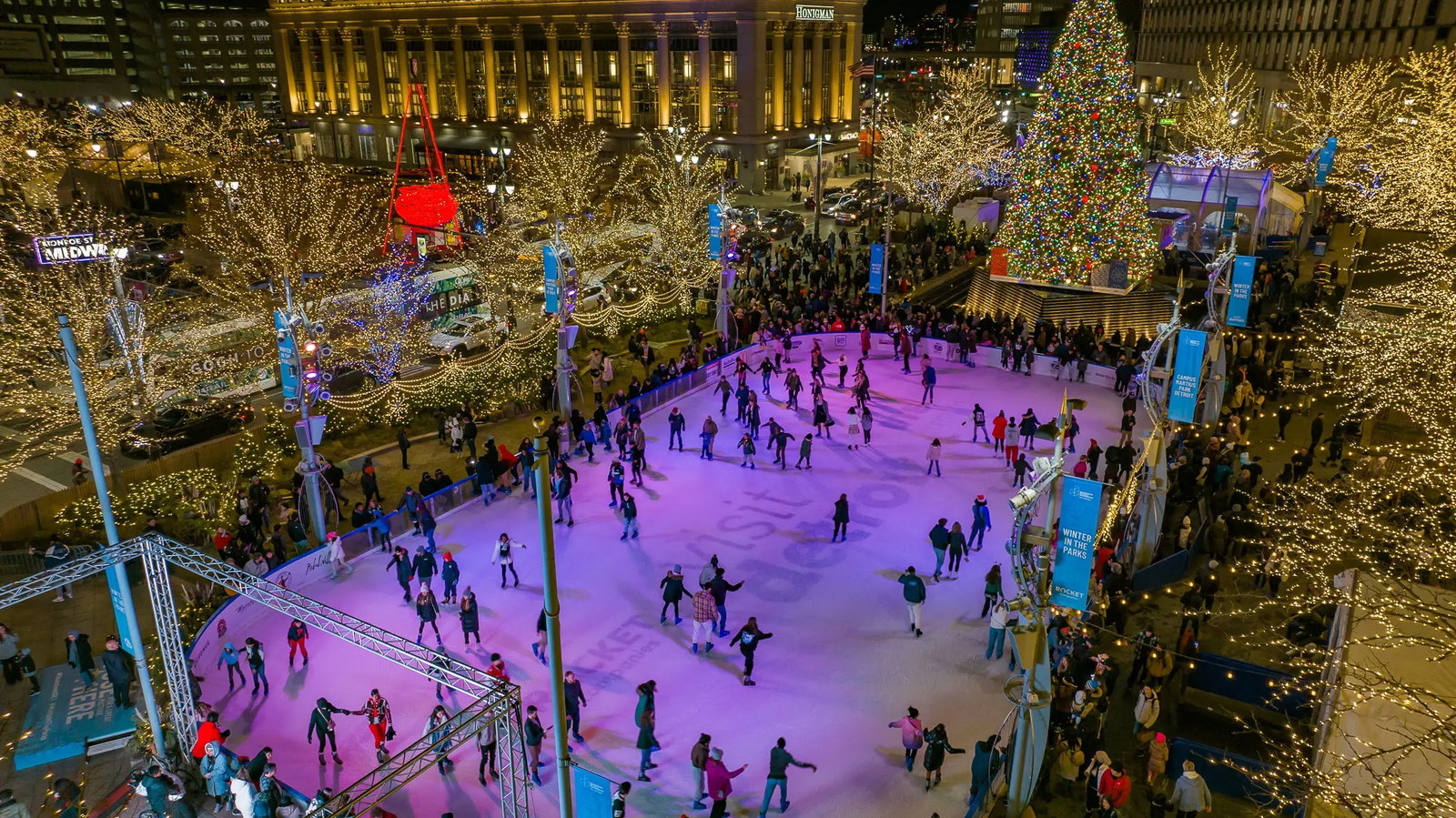
Name & Location: Campus Martius Park is a public park located downtown at the corner of Woodward Ave & Michigan Ave.
History & Significance: Dating back to 19th century Detroit, Campus Martius today serves as a central community hub hosting concerts, markets, ice skating, and events throughout the year under the shadow of downtown skyscrapers.
What to Expect: Visitors relaxing in Campus Martius can grab food, play games, ride the carousel, cool off by the fountain, go shopping as they take in views of Detroit’s impressive architecture all around.
Visitor Information: Campus Martius is open 24 hours daily. Admission is free. The nearest parking garages charge a fee.
As downtown’s central hub, the 5.5-acre Campus Martius Park bustles year-round with special events and daily activities. People watch in the tree-shaded square, meet friends by the iconic Woodward Fountain, and take in jaw-dropping views of the city from the tubular Michigan Soldiers’ and Sailors’ Monument. Skate the rink in winter where you can stay warm thanks to downtown’s high rises and fire pits. Set up for a picnic lunch or catch a free performance or movie during the warmer months when the park becomes an urban beach. But swing through any time of year to access downtown’s shops and restaurants just steps away.
Architectural Tours

Name & Location: Guided walking tours in downtown Detroit and nearby neighborhoods explore the city’s legacy of ornate skyscrapers, factories, churches, theaters and urban sites while detailing the history behind Detroit’s evolving architecture.
History & Significance: As an early industrial American hub, Detroit contains excellent examples of Art Deco, Beaux Arts, Gothic and Romanesque architectural design from the late 19th and early 20th centuries during its golden era.
What to Expect: Tours visit the city’s most significant buildings, inside and out, while docents relate stories about the structures, designers, and firms that shaped Detroit’s skyline.
Visitor Information: Private and group tours can be booked through companies like Detroit Experience Factory and Preservation Detroit at various times. Rates start around $45 per person.
Regal theatres, Art Deco towers, Victorian offices and more architectural treasures distinguish Detroit’s skyline. Get to know the rich stories behind the city’s buildings by exploring downtown on an expertly guided walking tour. Docents from the Detroit Experience Factory can tailor outings based on personal interests. Or choose a specialty jaunt like “Ty Cobb’s Detroit,” “Beyond Baseball Stadiums,” or “Detroit’s Flames.” Private tours work for families, groups and even architecture buffs eager to peek inside the opulent Guardian and Penobscot buildings. Visitors venturing on their own shouldn’t miss the jaw-dropping atrium inside the GM Renaissance Center.
Pewabic Pottery
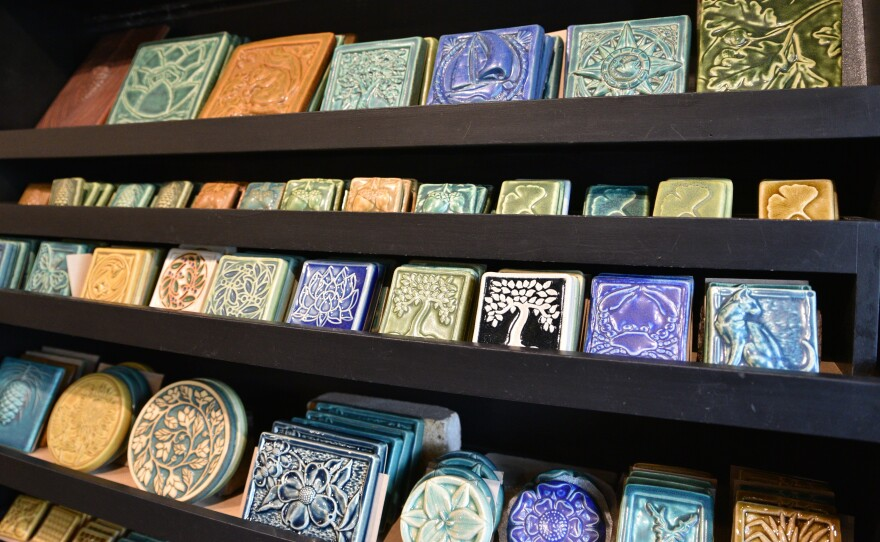
Name & Location: Pewabic Pottery is located at 10125 E. Jefferson Ave. in Detroit’s East Jefferson Historic District
History & Significance: Founded in 1903, Pewabic is renowned for its handcrafted tiles and vessels created from unique iridescent glazes. Pewabic tile can be spotted decorating many noted Detroit buildings.
What to Expect: Guests can shop for pottery pieces in the galleries, take a tour to see working pottery studios, and learn about Pewabic’s historic methods and glaze chemistry through ongoing educational exhibits.
Visitor Information: Pewabic is open Tues-Sat. Guided tours run select days for $8 per person and should be booked online ahead of time when available.
Discover why tiles crafted at this historic ceramic studio grace world-famous landmarks as varied as the Sistine Chapel, New York City Subway and Washington National Cathedral over the past century. Pewabic Pottery near Wayne State University has been firing distinctive iridescent vessels glazed in earthtone hues since 1903. Schedule a tour to watch resident artists form intimate tableware, jewelry, architectural accents and more during weekday workshops. The on-site exhibit and shop lets visitors take a rare piece of Detroit history home through their unique ceramic gifts.
Music and Performance Venues

Name & Location: Detroit is filled with fabled concert halls and theaters such as Fox Theater, Fillmore Detroit, Masonic Temple, Fisher Theater, Detroit Opera House, and others throughout city districts.
History & Significance: Detroit’s theaters and venues have showcased every musical great from Frank Sinatra to Lady Gaga while hometown Motown groups launched from these stages. Their mind-blowing architecture dazzles as well.
What to Expect: Fans can catch major touring concerts, Broadway musicals, standup comedy shows, orchestra performances and more at Detroit’s array of active venues, many built over a century ago during the city’s heyday.
Visitor Information: Event availability, showtimes and ticket access varies at each theater. Parking is generally available within proximity to most locations. Guided venue tours happen on occasion.
Motown isn’t the only genre on tap to enjoy live with Detroit’s thriving music and theater scene. The acoustically astounding Fox Theatre hosts touring musicals, star concerts and standup comics inside its lavish 1928 movie palace auditorium dripping in Indian, Asian and Near Eastern design details. Around the corner, the intimate Music Hall fills its 1913 interior with the sounds of jazz, rock, pop and country concerts from break-out musicians. Venture north to Midtown for avant garde theater inside the century-old Detroit Opera House or progressive concerts at the historic Fillmore. And seek out underground music and experimental acts inside dozens of eclectic bars and nightclubs throughout the city.
Corktown
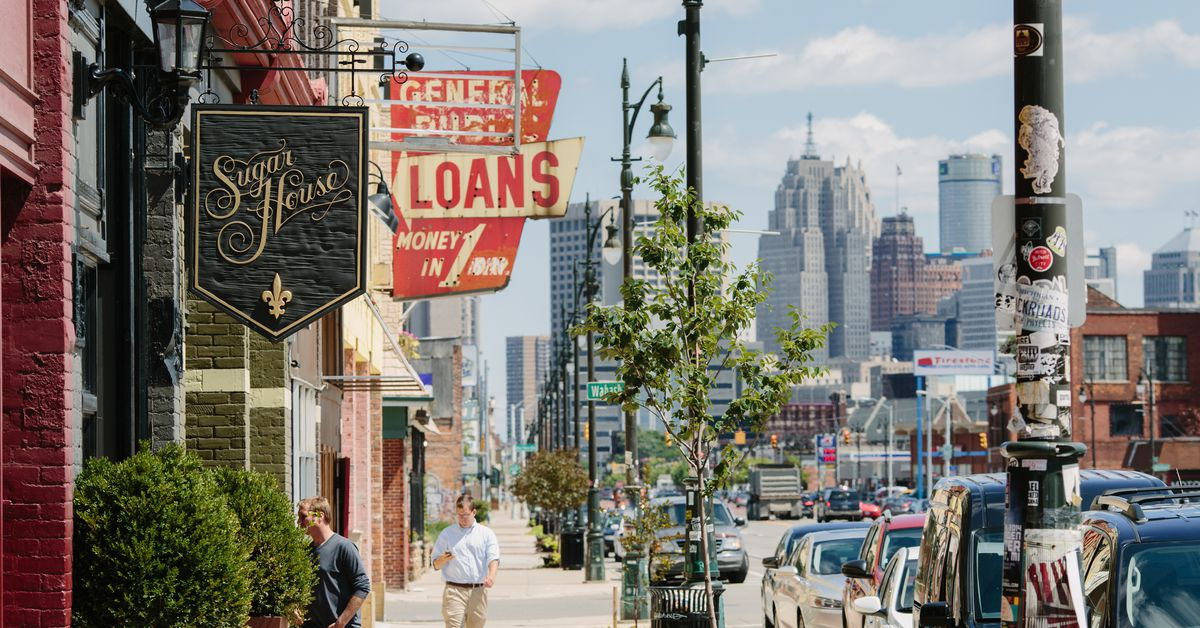
Meander the Michigan Avenue strip threading through one of Detroit’s hippest and history-steeped neighborhoods. Get a taste of Corktown’s arriviste dining scene fueled by farm-to-table eateries like Mudgie’s deli, Brooklyn Street Local, UFO Factory. Then grab a craft cocktail inside award-winning Sugar House tucked between intimate wine bars and cocktail lounges lining Michigan Avenue as it’s known locally. Don’t by shy about exploring side streets either inside this once predominantly Irish enclave. Here, you’ll discover chic shops, cafes, pubs, and some of the city’s trendiest restaurants situated in industrial-chic warehouses and refurbished Victorian homes.

